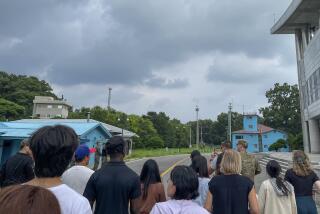Accord Reportedly Near on N. Korea Nuclear Inspection : Diplomacy: Washington says âa few wrinklesâ remain. Pyongyang must still work out terms of visits with international agency.
WASHINGTON â The United States and North Korea are drawing close to an agreement permitting international inspections of North Korean nuclear installations, âbut there are a few wrinkles that need to be ironed out,â a senior State Department official said Monday.
North Korea still needs to work out a separate agreement with the International Atomic Energy Agency based in Vienna on the specific terms and logistics of the nuclear inspections. There has been no major progress on that agreement yet, U.S. officials caution.
The North Koreans âhave not yet been in touch with the IAEA,â a senior Clinton Administration official said. âWe still donât have the clarifications that would be necessary for the IAEA to proceed with inspections.â
The Times reported Dec. 24 that Pyongyang generally had agreed at talks in New York to permit the international agency to inspect all seven nuclear facilities that the Communist regime has acknowledged on its territory. That concession opened the way for a possible end to the diplomatic stalemate over North Koreaâs nuclear program.
Several Administration officials said that the final details paving the way for an agreement might come as early as this week. But another senior U.S. official said that he is still unsure whether there will be any accord, because North Korea has a history of bargaining hard and raising last-minute obstacles.
Administration officials have suggested repeatedly that the United States and its allies might resort to sanctions or an oil embargo if diplomacy does not work.
Even if Washington and Pyongyang reach agreement permitting inspections of the seven North Korean facilities, it would amount to only a temporary easing of the dispute over Pyongyangâs nuclear program. Such a pact still would leave unresolved a number of disputes concerning North Koreaâs undeclared nuclear sites and its past efforts to develop nuclear weapons.
The nuclear crisis began last February when the international atomic agency told Pyongyang that it wanted to carry out special inspections of two sites where Western officials believe North Korea has hidden waste materials produced after it secretly reprocessed plutonium in 1989.
North Korea countered by announcing that it would pull out of the Nuclear Non-Proliferation Treaty, the international agreement that provides the basis for IAEA inspections. North Korean officials later withdrew that threat but then balked at permitting even regular visits by the international agency to their nuclear installations.
In effect, the agreement now under consideration would only return the situation to where it was last February, before the agency sought permission to make special inspections of the undeclared waste sites.
Under the scenario worked out in New York, after North Korea reaches an agreement paving the way for inspections, the United States and South Korea would formally agree to give up their annual Team Spirit joint military exercises.
And the United States and North Korea would then move forward to a third, broader round of diplomatic negotiations. Administration officials have said that at these talks, the United States would offer incentives--such as normal relations and economic benefits--in exchange for steps by North Korea to give up its suspected nuclear arms program.
One other obstacle that still needs to be worked out, U.S. officials said, is the Administrationâs insistence that North Korea also agree to a meeting of special envoys with South Korea. The Administration wants to make sure that North Korea meets face-to-face with South Korea rather than conducting its diplomacy only with the United States.
A State Department official said Monday that he does not believe this requirement for talks between North and South Korea will become a stumbling block.
More to Read
Sign up for Essential California
The most important California stories and recommendations in your inbox every morning.
You may occasionally receive promotional content from the Los Angeles Times.










